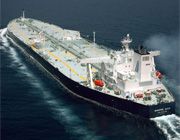
Many oil tankers in Libya's state-owned fleet remain anchored and unable to trade as cash flow issues continue to bite, a company managing some of their vessels said on Wednesday.
Crude oil shipments from Libya, once Africa's third largest producer, have been at a virtual standstill for months as leader Muammar Gaddafi has faced international pressure and sanctions while he fights to hold power during a bloody uprising.
While Libya's state-owned shipping firm General National Maritime Transport Company (GNMTC) is not targeted by sanctions, the tanker group is believed to be controlled by Gaddafi's son Hannibal, who is on a blacklist of individuals subject to travel bans and asset freezes.
"GNMTC is not on the list of designated individuals and entities; however Hannibal Gaddafi is, of course, on the list," said Laura Hamilton, an associate at law firm Norton Rose.
"The asset freeze not only applies to assets owned by the entities and individuals listed but also to assets held or controlled by them, hence the need for careful due diligence."
GNTMC has 18 vessels in its international trading fleet, seven of which are managed by the company and a further three by outside ship managers. The remaining eight are run by ship management firm V.Ships, a V.Ships spokesman said.
The spokesman said the eight tankers it managed were currently laid-up off Malta and Singapore.
"It's the whole political situation -- you can't get any money in or any money out in terms of working with Tripoli," the spokesman said.
"If there is no money flow, you can't trade, you can't pay for the bunkers, you can't pay for the crews, you can't pay for the ships and the ship owner can't get paid by the charterer. If no one can get paid, you have to stop the ship."
The spokesman said GNMTC was not able to pay the costs of keeping the tankers anchored, which was being borne by V.Ships, one of the world's biggest ship management companies.
"They (V.Ships) are doing the right thing," he said. "Owners and managers have to man laid up vessels anchored outside ports or in the inner anchorages under the International Safety Management code of practice. Only a skeleton crew is required however."
The spokesman said the tankers GNMTC managed were presumed to be "anchored somewhere else".
Tripoli-based GNMTC could not immediately be reached for comment.
SANCTIONS HURTING
Rebel fighters advanced towards Tripoli from the east on Wednesday in the biggest push in weeks. The advances came as reports proliferated that Gaddafi -- under pressure from a five-month uprising against his rule, sanctions and a NATO bombing campaign -- was seeking a deal under which he would step down.
"They (sanctions) are having an effect and, in general, they have limited the opportunities for shipping companies to call at ports because the restrictions affect their ability to trade. There is a hot war going on too which will further discourage activity," said Philip Roche, a partner at Norton Rose.
"Without a doubt, ship owners will have to think very long and hard and sit down with insurers before trading in Libya."
Libya produced 1.6 million barrels of oil per day before the war, or almost 2 percent of world output.
Last month the European Union added six Libyan ports to the list of assets frozen as part of sanctions on Gaddafi's government. The ports targeted are Tripoli, Al-Khoms, Zuara and the key oil terminals of Brega, Ras Lanuf and Zawiyah.
Maritime lawyers say the new EU regulations mean it will not be possible to arrange for the payment of port fees through a third party to avoid sanctions on the targeted port authorities.
"To date, the sanctions have focused on people rather than trade sectors. However, the most recent amendments provide for a distinction between contracts related to oil, gas and refined products and other contracts," said Norton Rose's Hamilton.
"It appears that the intention behind the new provisions is to starve those ports controlled by the present Libyan government of any funds brought in through international trade."
In the meantime, the country's vital seaborne activity continues to remain paralysed.
"Calling at a Gaddafi controlled Libyan port involves the risk of getting caught up in the fighting, and collateral damage as a consequence of NATO bombings is a possibility, although NATO bombings are normally very precise," said Jakob Larsen, maritime security officer with BIMCO, the world's largest private shipowners' association.
Larsen said Gaddafi's forces posed a threat to merchant shipping, especially if their situation became more desperate.
"Possible scenarios could include taking a crew hostage, use of crew as a bomb shield, or even hijacking ships and using them as tools of destruction against NATO warships, or for example, rebel controlled oil installations," he said.
Source: Reuters
We use cookies to improve your experience. By continuing to use our site, you accept our Cookies, Privacy Policy,Terms and Conditions. Close X